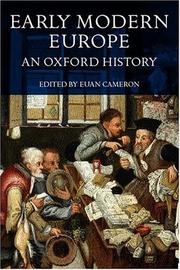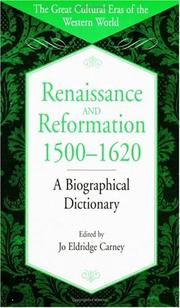| Listing 1 - 10 of 38 | << page >> |
Sort by
|
Book
Abstract | Keywords | Export | Availability | Bookmark
 Loading...
Loading...Choose an application
- Reference Manager
- EndNote
- RefWorks (Direct export to RefWorks)
History of civilization --- anno 1500-1799 --- Europe --- 930.86.02 --- 940.2 --- 008 --- #A91J2 --- 398 --- 926 --- Nieuwe Tijd --- Volkscultuur --- Mentaliteitsgeschiedenis:--Nieuwe Tijd --- Folklore --- 398 Folklore --- 930.86.02 Mentaliteitsgeschiedenis:--Nieuwe Tijd --- Popular culture --- 94(4) --- Geschiedenis ; Europa --- 934 --- volkscultuur --- nieuwe tijden --- temps modernes
Book
ISSN: 15734188 ISBN: 9789004240681 9789004240773 9004240772 9004240683 1283854929 9781283854924 Year: 2013 Volume: 165 Publisher: Leiden Boston
Abstract | Keywords | Export | Availability | Bookmark
 Loading...
Loading...Choose an application
- Reference Manager
- EndNote
- RefWorks (Direct export to RefWorks)
The time of the transition from the Middle Ages to the onset of early modernity (c. 1400-1550) is a very complex one. It brought what on first sight appear to be contradictory developments. Human creativity and freedom became much more important; yet, at the same time, the foundations were laid for systems that allowed control to be exercised over virtually every aspect of human social life. How can we put these two phenomena together? Which tendency is the stronger one? The contributions in this volume focus on the tension between creativity and norm-making from the perspective of different academic disciplines, so as to shed light on this fascinating period in our history.
Ethics --- History --- -241 "15/17" --- -Moraaltheologie. Theologische ethiek--Nieuwe Tijd --- Deontology --- Ethics, Primitive --- Ethology --- Moral philosophy --- Morality --- Morals --- Philosophy, Moral --- Science, Moral --- 241 "15/17" --- Philosophy --- Values --- Moraaltheologie. Theologische ethiek--Nieuwe Tijd --- General ethics --- anno 500-1499 --- Creative ability. --- Creativeness --- Creativity --- Ability --- Creation (Literary, artistic, etc.) --- Ethics - History - To 1500.

ISBN: 9780198207603 1283097745 9786613097743 0191588083 9780191588082 0198205287 9780198205289 0198207603 0191606812 9781283097741 6613097748 9780191606816 Year: 1999 Publisher: London : Oxford university press,
Abstract | Keywords | Export | Availability | Bookmark
 Loading...
Loading...Choose an application
- Reference Manager
- EndNote
- RefWorks (Direct export to RefWorks)
From the Renaissance and the Reformation to the Enlightenment and the French Revolution, early modern Europe was a period of political and intellectual upheaval. This extensively illustrated book offers a new kind of introduction to Europe between 1500 and 1800. Eleven leading historians examine different aspects of politics, religion, culture, and daily life, putting together a convincing and fascinating picture of Europe as it moved from the middle ages to themodern era.
940.20
---
940.20 Geschiedenis van Europa: Nieuwe Tijd--(16de-18de eeuw)
---
Geschiedenis van Europa: Nieuwe Tijd--(16de-18de eeuw)
---
History, Modern.
---
Modern history
---
World history, Modern
---
World history
---
Europe
---
History
---
#BIBC:ruil
Book
ISBN: 1282736094 9786612736094 0199713804 9780199713806 9780195337976 9780195165173 0195337972 0195165179 9781282736092 6612736097 0197718094 Year: 2009 Publisher: Oxford Oxford University Press
Abstract | Keywords | Export | Availability | Bookmark
 Loading...
Loading...Choose an application
- Reference Manager
- EndNote
- RefWorks (Direct export to RefWorks)
"Traces the interwoven changes that led from the world of Columbus, Luther, and the Mughal emperor Babur to the world of Locke, Louis XIV, and the Kangxi Emperor. Wills encourages his readers to acknowledge the special features of the European experience and achievement without presenting Europe as essentially the only source of the modern"--Provided by publisher.
History, Modern. --- Modern history --- World history, Modern --- World history --- Europe --- History. --- 940.20 --- History, Modern --- 940.20 Geschiedenis van Europa: Nieuwe Tijd--(16de-18de eeuw) --- Geschiedenis van Europa: Nieuwe Tijd--(16de-18de eeuw) --- anno 1400-1499 --- anno 1500-1599 --- anno 1600-1699 --- Middle Ages.
Book
ISBN: 1782384103 9781782384106 9781782384090 178238409X Year: 2014 Publisher: New York Berghahn
Abstract | Keywords | Export | Availability | Bookmark
 Loading...
Loading...Choose an application
- Reference Manager
- EndNote
- RefWorks (Direct export to RefWorks)
The significant changes in early modern German marriage practices included many unions that violated some taboo. That taboo could be theological and involve the marriage of monks and nuns, or refer to social misalliances as when commoners and princes (or princesses) wed. Equally transgressive were unions that crossed religious boundaries, such as marriages between Catholics and Protestants, those that violated ethnic or racial barriers, and those that broke kin-related rules. Taking as a point of departure Martin Luther's redefinition of marriage, the contributors to this volume spin out the
Marriage --- Married life --- Matrimony --- Nuptiality --- Wedlock --- Love --- Sacraments --- Betrothal --- Courtship --- Families --- Home --- Honeymoons --- History. --- Germany --- History --- Civilization. --- 392.4/.5 <43> "15/17" --- 392.4/.5 <43> "15/17" Verloving. Huwelijk. Huwelijksgebruiken. Partnerkeuze. Polyandrie. Polygamie. Monogamie--Duitsland--Nieuwe Tijd --- Verloving. Huwelijk. Huwelijksgebruiken. Partnerkeuze. Polyandrie. Polygamie. Monogamie--Duitsland--Nieuwe Tijd --- History of civilization --- History of Germany and Austria --- anno 1500-1799 --- anno 1800-1899
Book
ISBN: 9781641892988 1641892986 9781802700442 9781641892995 1641892994 1802700447 Year: 2022 Publisher: Leeds Arc Humanities Press
Abstract | Keywords | Export | Availability | Bookmark
 Loading...
Loading...Choose an application
- Reference Manager
- EndNote
- RefWorks (Direct export to RefWorks)
This book presents a comparative approach to the role of women in religious and monastic life in Europe and the Americas during the medieval and early modern periods. The contributors inquire into differences and similarities, continuities and discontinuities of women?s agency inside and outside the convent. The volume challenges traditional chronological and regional limitations such as those between the Middle Ages and the Modern era and stresses the transatlantic exchange of models between Europe and the Americas.
Monastic and religious life of women --- Monasticism and religious orders for women --- Spiritual life --- Monastic life --- History --- Christianity --- Christian spirituality --- Christian church history --- anno 1200-1799 --- Europe --- America --- 271-055.2 "15/17" --- 271-055.2 "15/17" Vrouwelijke religieuze orden, congregaties--Nieuwe Tijd --- Vrouwelijke religieuze orden, congregaties--Nieuwe Tijd --- RELIGION / Christianity / History. --- female monasticism. --- mulieries religiosae. --- nuns. --- transatlantic. --- 600-1699
Book
Abstract | Keywords | Export | Availability | Bookmark
 Loading...
Loading...Choose an application
- Reference Manager
- EndNote
- RefWorks (Direct export to RefWorks)
polyfonie --- passiemuziek --- Music --- anno 1500-1599 --- Musique --- Muziek --- 78.087.62/.67 --- Academic collection --- analyse --- musicologie --- lijdensverhaal --- nieuwe tijd (x) --- 513 --- Meerstemmige muziek. Polyfonie --- Muziekanalyse - vormleer --- 78.087.62/.67 Meerstemmige muziek. Polyfonie --- 78.24 --- 521 --- Muziekgeschiedenis (Oudheid - Renaissance) --- musicians
Book
ISBN: 9050670415 9789050670418 Year: 1987 Publisher: Schoten: Hadewijch,
Abstract | Keywords | Export | Availability | Bookmark
 Loading...
Loading...Choose an application
- Reference Manager
- EndNote
- RefWorks (Direct export to RefWorks)
Dutch literature --- #GSDBL --- literatuur --- historische roman --- nieuwe tijd (x) --- Mexico [land in werelddeel Amerika] --- C3 --- 741 --- #GGSB: Literatuur (letterkunde) --- Kunst en cultuur --- Proza - Nederlands --- Cortés, Hernán, --- Fiction. --- Nederlandse letterkunde --- Literatuur (letterkunde)

ISBN: 0313305749 9781567507287 156750728X 9780313305740 9798216007555 Year: 2001 Publisher: Westport ; London : Greenwood press,
Abstract | Keywords | Export | Availability | Bookmark
 Loading...
Loading...Choose an application
- Reference Manager
- EndNote
- RefWorks (Direct export to RefWorks)
Provides basic information on the people who have contributed significantly to the culture of Western civilization. Covers such figures as the religious leaders who contributed to the Reformation, scientists who paved the way for a new view of the universe, and Renaissance painters, sculptors, and architects, as well as writers, musicians, and scholars.
Renaissance --- Reformation --- Réforme (Christianisme) --- Biography --- Dictionaries --- Biographie --- Dictionnaires anglais --- Europe --- 929 "15/17" --- 930.85.44 --- Protestant Reformation --- Church history --- Counter-Reformation --- Protestantism --- Revival of letters --- Civilization --- History, Modern --- Civilization, Medieval --- Civilization, Modern --- Humanism --- Middle Ages --- Biografieën: verzamelbiografieën: Nieuwe Tijd --- Cultuurgeschiedenis: Renaissance --- History --- Europe. --- Council of Europe countries --- Eastern Hemisphere --- Eurasia --- 930.85.44 Cultuurgeschiedenis: Renaissance --- 929 "15/17" Biografieën: verzamelbiografieën: Nieuwe Tijd --- Réforme (Christianisme) --- BIOGRAPHIES --- 16E-18E SIECLES --- DICTIONNAIRES --- Religious leaders --- Scientists --- Artists --- Authors --- Musicians --- Scholars
Book
ISBN: 9782753551732 2753551731 2753555664 Year: 2016 Publisher: Rennes: Presses universitaires de Rennes,
Abstract | Keywords | Export | Availability | Bookmark
 Loading...
Loading...Choose an application
- Reference Manager
- EndNote
- RefWorks (Direct export to RefWorks)
Un dialogue des savoirs : telle est l'ambition de cet ouvrage qui vise à faire échanger histoire des sciences et histoire des techniques. Deux historiographies qui, pour être complémentaires, n'ont pas pour autant toujours été associées. Les techniques ont été, en effet, longtemps perçues comme des « sciences appliquées ». Or il s'agit plutôt de décrypter comment, à quels moments, dans quels contextes sociaux, elles ont pu être envisagées comme subordonnées aux sciences. Pour quelles raisons, par exemple, les techniciens sont-ils « invisibles » aux yeux des savants dans l'Angleterre du XVIIe siècle ? Ce dialogue mérite d'être étudié depuis les contextes européens, du XVe au XVIIIe siècle, quand les sciences « modernes », en particulier « expérimentales », s'affirment dans une interaction constante avec les techniques. Des lieux de savoir hybrides, intermédiaires, des « trading zones », permettent ce contact fructueux entre savants et praticiens, depuis les laboratoires et les collections jusqu'aux ateliers, aux mines, aux arsenaux ou aux navires mêmes. Dans ces lieux, la dichotomie entre technique et science, pratique et théorie, s'efface, invitant à considérer, dans un mouvement conjoint, la science comme produit de la matérialité et les techniques comme relevant de l'intellection. L'approche des savoirs scientifiques et techniques privilégiée ici est sociale, culturelle et politique. Les auteurs insistent sur l'insertion des savoirs dans les sociétés et les interactions entre savoirs et pouvoirs. Comment la construction et la diffusion des savoirs ont transformé l'approche du monde et de la nature, la conception même du temps et de l'espace, dans l'Europe moderne ? Des villes de la péninsule italienne à la Renaissance aux expéditions scientifiques menées par l'Académie royale des sciences ou la Royal Society durant les Lumières, la transformation territoriale, politique et sociale de l'Europe s'est effectuée autant par la maîtrise de savoir-faire techniques que…
History of Europe --- anno 1500-1799 --- anno 1400-1499 --- Science --- Technology --- Sciences --- Technologie --- Social aspects --- History. --- Aspect social --- Histoire --- History --- Culture scientifique et technique --- Learning and scholarship --- Europe --- Civilisation --- Civilization --- 940.20 --- 5 <09> --- 5 <09> Geschiedenis van wiskunde en natuurwetenschappen --- Geschiedenis van wiskunde en natuurwetenschappen --- 940.20 Geschiedenis van Europa: Nieuwe Tijd--(16de-18de eeuw) --- Geschiedenis van Europa: Nieuwe Tijd--(16de-18de eeuw) --- History & Philosophy Of Science --- histoire des techniques --- voyage scientifique --- savants
| Listing 1 - 10 of 38 | << page >> |
Sort by
|

 Search
Search Feedback
Feedback About UniCat
About UniCat  Help
Help News
News